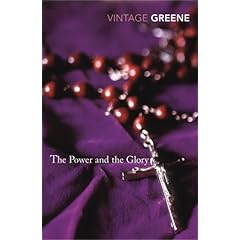 --The blurb--
--The blurb--"This title is provided with an introduction by John Updike. During a vicious persecution of the clergy in Mexico, a worldly priest, the 'whisky priest', is on the run. With the police closing in, his routes of escape are being shut off, his chances getting fewer. But compassion and humanity force him along the road to his destiny, reluctant to abandon those who need him, and those he cares for."
from www.amazon.co.uk
--The review--
Graham Greene's biography makes him seem an elusive, talented, tortured and somewhat hypocritical being: the converted, lapsed and then returning Catholic, intelligent and bullied at school. These qualities are all also, perhaps unsurprisingly, to be found in spades in The Power and the Glory: the unnamed main character embodies elusiveness in his escape from the law, a tortured nature in his grapples with morality (his duty and his actuality) and the associated hypocrisy. He is a drinker, gambler, liar and philanderer who in the book regularly stands by and allows others to be killed to protect himself, despite knowing that his game will inevitably soon be up regardless. And yet we keep reading not because we love to hate him, but because of his humanity: people are by definition not perfect (i.e. they are not God), and the character not only offers illuminating insights on the nature of religion and of humankind, but also provides suitable contrasts against the other characters, who protect him, despise him, and beg of his help in equal measure. Characterisation is generally strong, and it is easy to picture the novel's entire cast, from the precocious child, Coral Fellows, to the bewildered bystander, Mr Tench, to the various stern police officials and the remaining believers who beg for sacrament.
The novel's structure is perhaps a little bewildering at first: it skips from minor character to minor character, whom you often won't hear from again until the end. However, this serves as an excellent frame for the more intense tribulations of the main character, and the story ends with whom it began, providing an excellent comedown. While there is little or no element of surprise in the plot - the inevitability of the dénouement and outcome is made clear from the start - the elements of fascination come from character development, with other points of interest coming from the descriptions of setting and the main character's more philosophical ruminations on human nature and religious belief. It is a story that can be savoured because of this; there is no need to race through, since so much food for thought is provided throughout (and all without making your head hurt). It can easily be read and reread, allowing the layers of the narrative to be scratched away at, and there is only one arguably weak point in the entire book, concerning an unnecessary insertion on the subject of the main character's persecution at school (thankfully it is a rather short interjection, but Greene could have easily omitted it to the book's advantage).
This is a simultaneous story of persecution and justice, and is a good introduction to Greene's work. It emphasises the power and powerlessness of both God and human beings, it lingers intensely in the mind, and makes the reader query whether or not justice has really been done.
Other works by Graham Greene
Monsignor Quixote (1982)
Ways of Escape (1980; autobiography)
A Burnt-Out Case (1960)
The Potting-Shed (1957)
The Quiet American (1955)
The End of the Affair (1951)
The Third Man (1949)
The Heart of the Matter (1948)
Brighton Rock (1938)





No comments:
Post a Comment